As planned, we visited the kindergarten last Tuesday the 11th April 2023. Our goal of the visit was to teach the children about green roofs and what they do for environment.
The kindergarten is located in Gibswil and upon arrival the teacher helped us to set up everything. Soon after the children arrived, Leon gave them a short introduction of our project. To make it more understandable for the children he used questions such as "Who has a garden? What kind of plants do you grow in your garden? Have you ever imagined your garden being on top of your roof?"
The children were really excited and told us about their garden and what kind of vegetables, flowers or other plants they are growing together with their parents.
We also brought along our own miniature green roof that we had built in advance so that the children could visualize it better.
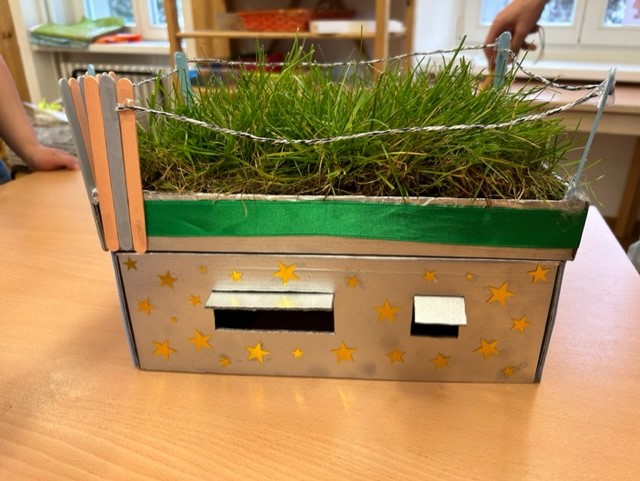
Afterward we split the 12 children into groups of three and started working on the miniature green roof. Some were more excited than others, but in general almost all of them liked the idea of decorating their own "house" and getting their hands dirty while planting the seeds for the green roof.
Here are some pictures of the children decorating the shoebox and planting the seeds:
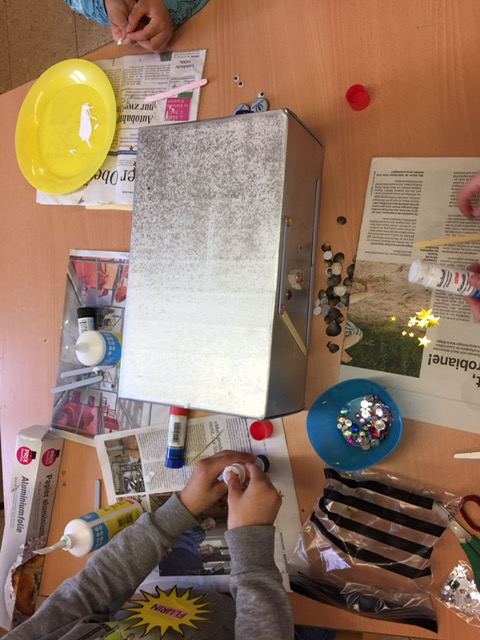
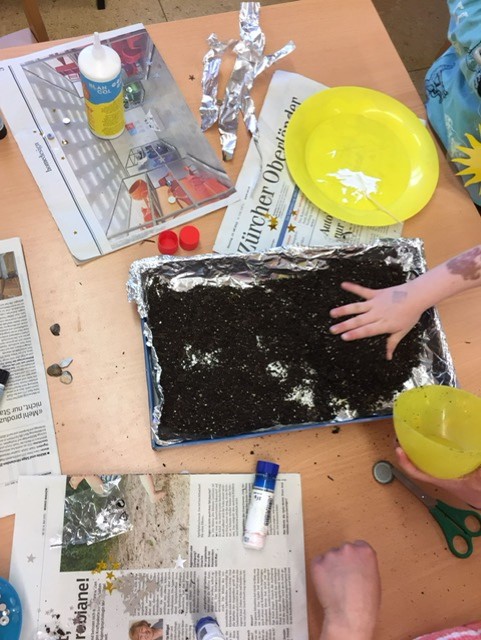
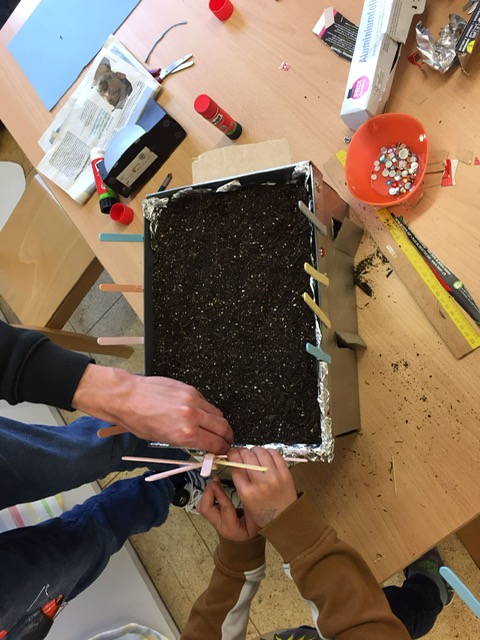
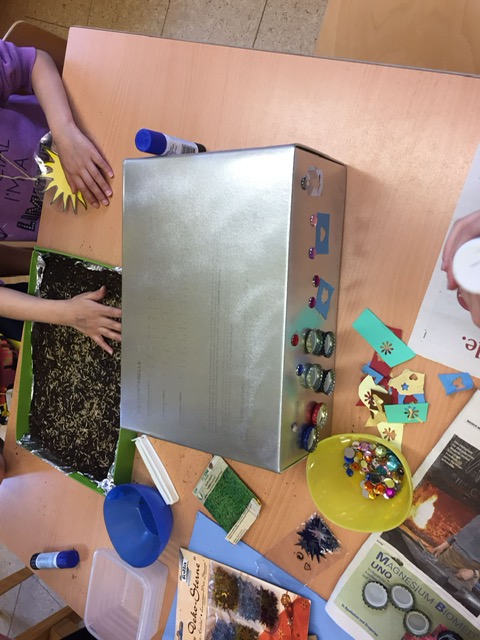
We spent approximately two hours at the kindergarten and the children really enjoyed this experience. They were all really enthusiastic and couldn't wait for the seeds to grow. In total, we built three miniature green roofs with the children. Over all, it was a memorable and educational experience for us.
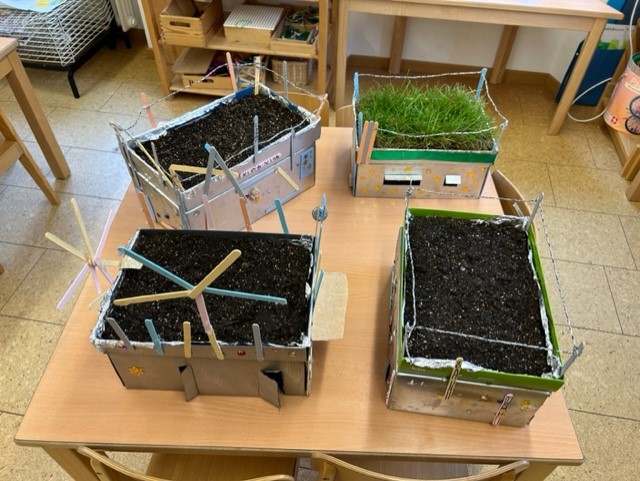
As there have been some developments with my collaborators, I would like to provide a brief update.
- The meeting with the wastewater treatment team from Rüti went smoothly, and I have an audio recording to transcribe the discussions.
- I have also managed to secure Ms. Alexandra Kappeler as a collaboration partner. She is an expert in wastewater management both domestically and internationally. She is currently in Ethiopia this week, but I will try to contact her next week to finalize the details.
I am happy that this has worked out, as it will give me the opportunity to gain insights into wastewater management practices in another country.
On March 30, 2023, the day had finally arrived. I was able to visit the wastewater treatment plant in Rüti in the Zurich Oberland region. Thanks to my connection with my employer (Rüti municipality), it was relatively easy to arrange a visit. Prior to my visit, I had prepared some questions and sent them to the wastewater treatment plant team. When I arrived there, the operation of the wastewater treatment plant was explained to me first. I will try to summarize the important steps here. More...
For our IDAF we have contacted a few more media outlets. We send E-Mails to general media outlets and as well to those which focus on nature and enviroment. We have also made an effort to ask our families and friends if they have any contacts which could help us publish our article. Sadly no one of us knows someone who works for a media outlet.
1. WOZ Die Wochenzeitung (contacted on the 15th april 2023), reply received! Check seperate post.

2. Züriost (contacted on the 15th april 2023), no reply yet.

3. Pro Natura (contacted on the 15th april 2023), no reply yet.

We have started contacting different news outlets, such as newspapers.
This was our first effort in trying to contact a newspaper:
Umwelt Zeitung (contacted on the 11th april 2023), no reply received yet.

Team with Nina, Inês and Alisha
As planned in our time table we finalised the survey questions and created the survey in the kobotoolbox. We are now waiting on clearance from our teacher so that we can deploy the survey and send it to different schools. Maybe we will have a test run beforehand. We started creating the post for the social media team so they can publish the survey as well.
As soon as we have clearance we will publish the survey as well as the instagram post. We will then start thinking about how to analyze the survey and start writing a post about the results.
We will update you again next week before the spring holidays :)
The following informations we got from wikipedia and several online websites.
Animal welfare in the USA
The Animal Welfare Act in the United States regulates the treatment of animals which are kept in research facilities or zoos at the national level. It's called the "Animal Welfare Act" (AWA) and has existed since August 24, 1966.
Unfortunately, there is no corresponding national law for the husbandry and treatments of livestock farming.[1]
Slaughtering
In the USA, there has been a law since 1958 that farm animals must be stunned before slaughter to minimize pain.
Hühner, Truthähne und Vögel sind jedoch nicht in diesem Gesetz enthalten. Weshalb diese Tiere anders empfinden als andere Nutztiere ist unklar. [2]
Transport
In the USA, livestock farming can be transported without food or water for 28 hours. Loading or unloading can increase the total time to 36 hours. This law has existed since 1873.
The following informations we got from wikipedia and several online websites.
Animal welfare in the EU
Animal welfare in the EU is not controlled and not sanctioned. Animal welfare is a foreign word in many EU countries.
Outside of Switzerland, many countries rely on cheap, mass and surplus production. The animal welfare guidelines of the EU only cover individual aspects or animal categories.
There are no animal welfare guidelines in the EU for keeping cows, cattles, turkeys, ostriches, all types of poultry except chickens, sheep, goats and horses.
In many EU countries, there are hardly any inspections of husbandry systems and stable facilities. Farmers who do not comply face little to no sanctions. [1]
Transport
Millions of animals are transported across Europe every day, mainly by truck, sometimes even by ship overseas. Approximately 1.5 billion animals are being transported in Europe every year.
Since 1977 there is a law to protect the animals during the transport in the EU, but the animals are not really protected because this law doesn't set a time limit for the transport.
In addition, the statutory space requirements are too tight. The animals can hardly lie down to rest. [2]
Our project will end in an article.
We already made an audio sequence highlighting the goals and steps in advance of our project.
But now we will do a teaser video including the most important facts out of the interview to spark interest in the first place for our final article.
Last week we had an interview with two students from India.
We agreed that they will also do an interview with an athlete.
Now we will do the interview with our athletes and wait for their interview.